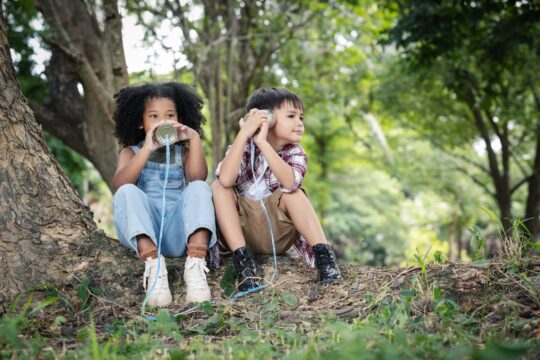Nature-Based Learning in Early Years Education: Embracing the Great Outdoors
In this blog post, we’re stepping into the natural world to uncover the beauty, benefits, and boundless opportunities that connecting with nature brings to young learners.
The Beauty of Nature-Based Learning:
Nature has a remarkable ability to captivate the hearts and minds of children. It offers a boundless classroom where curiosity thrives, discoveries unfold, and connections with the world around us form naturally. Nature-based learning takes education beyond the confines of a traditional classroom, allowing children to learn through direct experiences with their environment.
Benefits of Nature-Based Learning:
- Holistic Development: Engaging with nature nurtures holistic development. Physical activity like running, climbing, and exploring enhances gross motor skills, while cognitive engagement with the natural world stimulates critical thinking, observation, and problem-solving. Nature’s tranquility also supports emotional well-being.
- Environmental Awareness: By connecting with nature from an early age, children develop a strong sense of environmental stewardship. They learn to respect the delicate balance of ecosystems and the importance of conserving our planet’s resources for future generations.
Exploration and Sensory Experiences:
- Outdoor Adventures: Invite children to embark on nature walks, hikes, and explorations in local parks, nature reserves, or even within your own outdoor learning space. Let them discover the fascinating world of insects, plants, and natural phenomena like the patterns in tree bark or the textures of different leaves.
- Sensory Play: Nature is a sensory wonderland! Encourage sensory play by incorporating natural elements such as leaves, sand, water, and sticks into various activities. Children can feel different textures, hear the rustling of leaves, and even experience the scent of various plants.
Nature-Inspired Arts and Crafts:
- Leaf Rubbings: Collect leaves of various shapes and textures during your outdoor explorations. Then, bring these treasures back indoors to create leaf rubbings, allowing children to observe the intricate details of nature up close.
- Nature Collages: Encourage artistic expression by using collected natural materials like leaves, twigs, and flowers to create beautiful collages. This activity not only connects children with nature but also supports fine motor skills and creativity.
Science and Exploration:
- Outdoor Investigations: Nature is a natural laboratory! Encourage children to ask questions about their surroundings and facilitate their exploration. Dive into topics such as weather, plants, animals, and the captivating changes that occur with each passing season.
- Gardening Adventures: Create a small garden space within your outdoor area where children can get their hands dirty, plant seeds, care for plants, and witness the miraculous journey of growth. Gardening fosters patience, responsibility, and a deeper understanding of the natural world.
Storytelling and Nature Tales:
- Nature Stories: Share a diverse selection of books and stories that center around nature, animals, and outdoor adventures. This practice not only introduces children to the wonders of reading but also nurtures their connection to the environment.
- Outdoor Storytelling: Take storytime beyond the classroom walls! Venture outdoors, allowing children to engage with stories while surrounded by the sights, sounds, and scents of nature. This multisensory experience enhances their engagement and imagination.
Parent Involvement:
- Nature Exploration Challenges: Extend the learning beyond school hours. Encourage families to embark on nature-based activities together, such as nature scavenger hunts, birdwatching, or stargazing. These activities strengthen the bridge between the learning environment and home life.
- Family Nature Walks: Inspire families to create their own outdoor adventures by going on nature walks and exploring local parks. Encourage them to share their discoveries with the children, fostering a sense of continuity between what’s learned in school and what’s experienced at home.
Safety and Supervision:
- Balancing Risk and Play: While encouraging outdoor exploration and play, ensure that children are engaged in controlled risk-taking. Activities like climbing fallen logs, balancing on tree stumps, or navigating uneven terrain can enhance physical coordination and confidence under proper supervision.
- Sun Safety: Emphasize the importance of sun protection during outdoor activities. Ensure that children are dressed in appropriate clothing, hats, and sunscreen to shield them from the sun’s rays.
By embracing nature-based learning, you’re creating a vibrant educational experience that fosters a deep connection with the environment. Every moment spent in nature becomes a lesson, an exploration, and a source of wonder. The impact of these experiences goes beyond the classroom, nurturing a generation of environmentally conscious, curious, and resilient individuals.



Comments are closed.